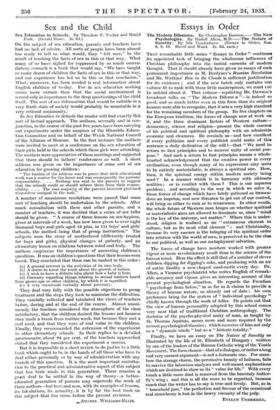Essays in Order
TIIAT remarkable little series " Essays in Order " continues its appointed task of bringing the wholesome influences of Christian philosophy into the turbid currents of modern thought. That it should already have given us essays of such permanent importance as M. Berdyaev's Russian Revolution and Mr. Watkins' Row in the Clouds is sufficient justification for its existence ; and if the new batch only contains one volume fit to rank with these little masterpieces, we must tot be unkind about it. That volume—reprinting Mr. Davrson's broadcast talks on " The Modern Dilemn a "—is indeed so good, and so much better even in this form than its original hearers were able to recognize, that it sets a very high standard for the remaining members of the group. Its five chapters on the European tradition, the forces of change now at work on it, and the three dominant factors of Western culture— democracy, science and religion—present the whole essence of his political and spiritual philosophy with an admirable economy and clearness. He reminds us—and how excellent if every politician and every publicist could make of this sentence a daily dedication of the will I—that " We need to return to first principles and to recover unity of social pur- pose." And such a return to first principles means a whole- hearted acknowledgement that the creative power in every civilization, even though many of its expressions may seem to be entirely materialistic, is always a spiritual one. How, then, is the spiritual energy within modern society being used Y In a manner which is in harmony with ultimate realities ; or in conflict with them ? This is our supreme problem ; and according to the way in which we solve it, those forces of change which have lately gathered so tremen- dous an impetus, and now threaten to get out of our control, will bring us either to ruin or to renascence. In other words, the whole future of Western man hinges on whether spiritual or materialistic aims arc allowed to dominate us, since " mind is the key of the universe, not matter." Where this is under- stood, religion is realized as no " extraneous element in culture, but as its most vital element " and. Christianity, because its very essence is the bringing of the spiritual order into relation with the world of men, is perceived to be the clue to our political, as well as our metaphysical salvation.
The forces of change have nowhere worked with greater vigour or more revolutionary result than in the science of the human mind. Here the effect is still that of a number of clever children digging for digging's sake, and producing with an air of entire finality a new-shaped sand-castle every day. Dr. Alleys, a Viennese psychiatrist who writes English of remark- able accuracy and vigour, gives an interesting account of the present psychological situation. He regards the Freudian " psychology from below," in so far as it claims to provide a theory of human nature, as already out of date : his own preference being for the system of " individual psychology " chiefly known through the work of Adler. He points out that the view of human personality adopted by this school comes very near that of traditional Christian anthropology. The doctrine of the psycho-physical unity of man, as taught by St. Thomas Aquinas, seems more and more required by the newest psychological theories ; which conceive of him not only as a " dynamic whole " but as a " historic totality."
Finally, we have an essay on The Nature of Sanctity as illustrated by the life of St. Elizabeth of Hungary ; written by one of the leaders of the Roman Catholic wing of the Yout h Movement. The form chosen—that of a dialogue, or rather a long and very earnest argument—is not a fortunate one. For some- how the strange charm, the persuasive beauty of holiness, fails to survive the laborious analyses and well-meant explanations which are destined to show us its " value for life." With every touch a little more dust is removed from the heavenly butter- fly's wing ; and this is all the more to be regretted, because much that the writer has to say is true and lovely. But, as in " household jam," the perfection and flavour of the occasional real strawberry is lost in the heavy viscosity of the pulp.
EvEmrst UNDEUIIILL.






































 Previous page
Previous page